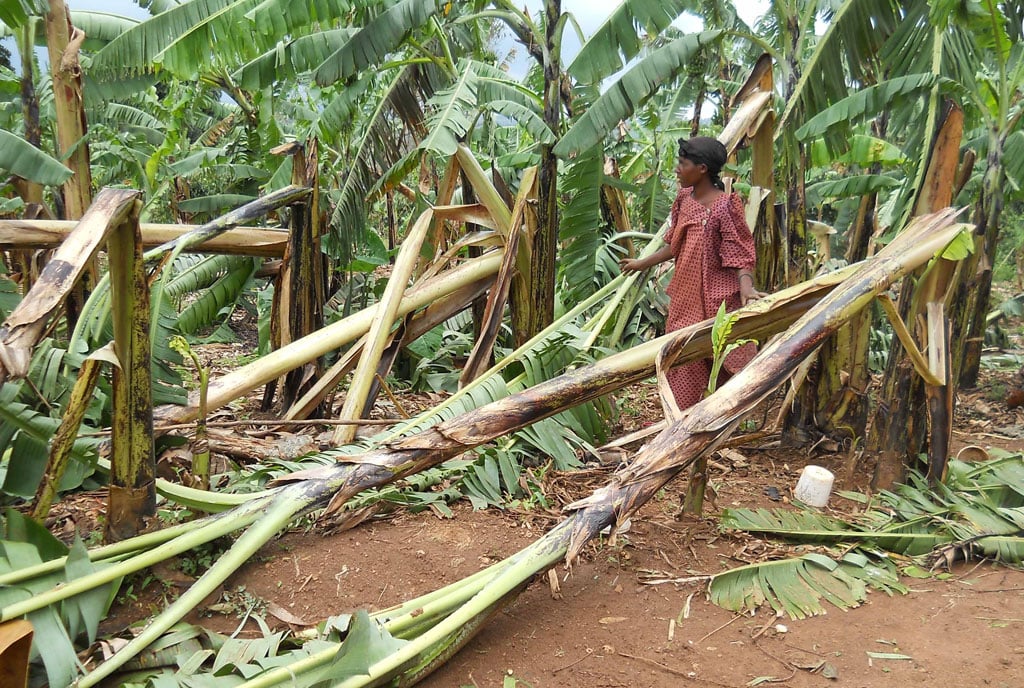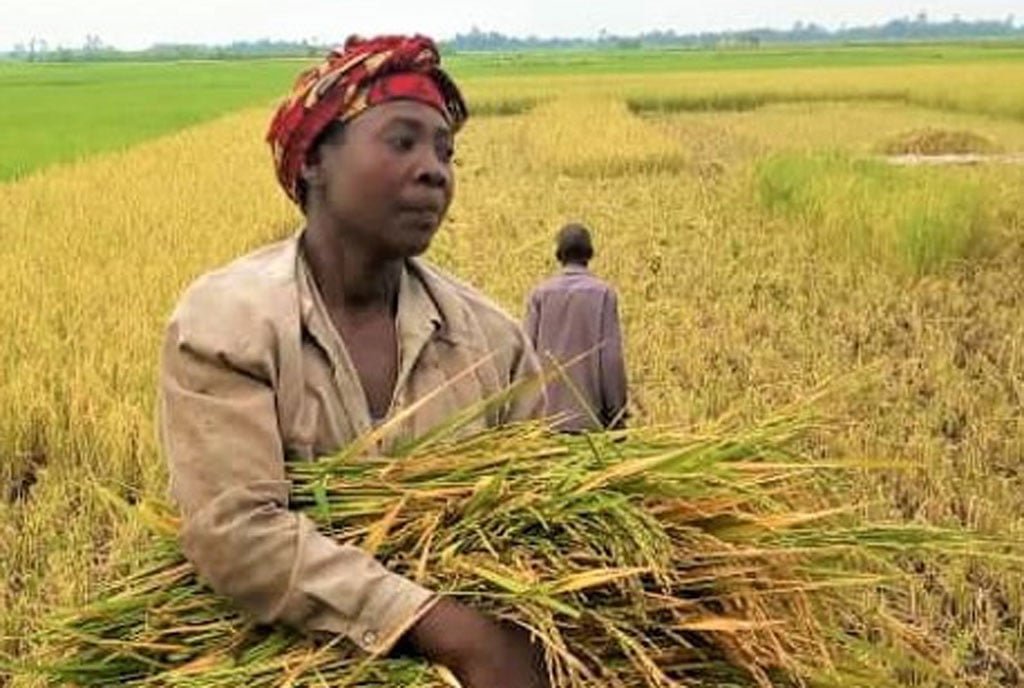Prime
Rain problems for the farmer to overcome

A farmer in Masaka examines the destruction of her banana plantation by a rainstorm. PHOTO/MICHAEL J SSALI
What you need to know:
- In order to reduce vulnerability to climate variability and change there is need for innovative approaches for managing climate risks while also helping farmers to adapt to climate change.
Since water is so important for plant growth to take place, one of the most important considerations for everyone planning a farming enterprise is rainfall reliability. Water is actually important for all life processes to occur. Livestock and human beings drink water as part of their diet and the most common source of water in rain.
The questions to ask will be about how much rain falls in a given region, how it is distributed and whether the amount and distribution are reliable for the intended farming activity. Many areas in Uganda are not well suited for growing particular crops or for keeping some types of livestock because of rainfall unreliability.
Some districts get heavy showers for just a few months only to go for up to eight months without sufficient rain. It is the reason why in many areas crops such as coffee and bananas are not grown because they require well distributed rainfall throughout the year. Where the rain seasons are short it is only the fast growing crops like beans, millet, and maize that are grown.
Farmers normally pray for rain in order to get good yields.
However, quite often in some areas we have incidences of high rainfall intensities resulting in strong runoff, heavy soil erosion, and widespread floods that submerge entire crop fields. Under such circumstances bridges get washed away and deep gauges develop in most rural roads, making transportation of farm products to markets very difficult. In the recent months Uganda has experienced abnormally heavy rainfall that has caused horrific damage to crop fields and settlements, not to mention the several breakages of bridges across the country.
Common problems
Unfortunately, with the onset of climate change we are bound to see more extreme weather conditions all of which will have negative effects on farming.
Dr Herman Ssekiwunga, the Principal Veterinary Officer, has told Seeds of Gold that rainfall is good for livestock keepers because during the rainy season the grass growth rate is high and the cows, the goats and sheep have a lot of grass to feed on.
“They don’t have to be driven for long distances to find water because there will be plenty of it trapped in the nearby valleys. But there are problems that come with the rain for the farmer to worry about. Heavy rainfall also supports lush pastures which cause diarrhea in animals. When vegetation grows during the rainy season even undesirable and poisonous plants grow and farmers must remove such dangerous plants growing in the grazing area of livestock,” Ssekiwunga says.
He mentions that heavy rains cause water logging in the grazing ground on some farms which deprives the animals of grazing space and grass to eat.
Dr Ssekiwunga further revealed that too much water trapped in the grazing area causes such diseases as foot rot which makes walking painful for the animals.
“Rain also causes the rapid multiplication of disease-causing parasites like tsetse flies, worms, liver flukes, and ticks. There are also nuisance flies that make the cows spend more time wagging their tails than feeding. All those problems mean bigger expenditure by the farmer on inputs such as acaricides and paying the vet doctors called in to treat the sick animals. Such expenses reduce the farmers’ profits,” he says.
Joseph Nkandu, Executive Director of the National Union of Coffee Agribusiness and Farm Enterprises (NUCAFE) has says the harvesting season of coffee in many coffee growing districts has been extended for several weeks because of the prolonged pounding rains.
“We want our farmers to dry the coffee very well and since there tends to be more rain than sunshine the farmers face a big challenge to get the coffee well dried. Ugandan coffee quality has attracted international recognition and we have been winning awards in the recent years. We don’t want to lose that good reputation because of failure to attain the required coffee dryness and other attributes. Insufficient drying of grain and coffee and poor storage practices are said to cause aflatoxins which are dangerous to human life. Most coffee farmers sundry their harvested coffee and if there is no sufficient sunshine and it keeps raining most of the time the quality of the coffee could be compromised,” he says.
Guarding against losses
According to the National Agricultural Research Organisation (Naro) Uganda loses 17.6 percent of its maize annually due to poor post-harvest handling technologies which also creates molding by fungi in maize which results in aflatoxins.
Gerald Sendaula, the former Minister of Finance and now a prominent maize farmer, encourages the use of cribs. It is relatively a new and improved method of drying maize. It dries maize cobs immediately and stores maize for several weeks as the farmer waits for prices to improve.
Agriculturalists also recommend the use of PICS bags to store maize grain for small scale farmers. They also recommend ‘solarisation’ which is a technology of using sunshine to keep grain free from pest attack.
A leaflet from NARO reads: “This is a technology that reduces use of storage chemicals to control pests. It uses heat to kill storage pests in grain. For this technology, a pit of 3ft wide and 30cm deep is layered with 15cm of dry grass at the bottom to stop the grain from absorbing the soil moisture. A black polythene sheet is laid on top of the grass on which weevil infested grain is placed. It is tightly covered with a transparent polythene sheet to block off air circulation. The weevils are killed by high temperatures within two hours of sunshine.”
During a recent interview, Charles Katabalwa, the Managing Director of SAWA Agricultural Development Company, told Seeds of Gold that too much rain can cause big problems for the farmer. He said it can cause poor pod development in beans.
He also said it can cause abortion of flowers resulting in small bean size. He expressed concern that this season’s beans might generally be smaller than the usual size.
El Niño
Seasonal rainfall began as typically expected in March 2023 and has had mixed spatial and temporal performance through the season. Across all regions, rainfall was above average in early March, followed by a dry spell from late March into early April, primarily affecting northern and eastern Uganda.
Above-average rainfall resumed across all regions from mid to late April. Parts of the southwest and areas around the Lake Victoria basin received the highest cumulative rainfall and experienced flooding in late April.




